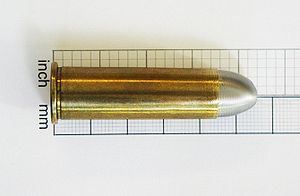.50-70 Government
| .50-70 Government | |
|---|---|

|
|
| general information | |
| caliber | .50-70 (.50 Government) 12.7 × 44R |
| Sleeve shape | Edge sleeve |
| Dimensions | |
| Sleeve neck ⌀ | 13.59 mm |
| Floor ⌀ | 12.95 mm |
| Cartridge bottom ⌀ | 16.76 mm |
| Sleeve length | 44.45 mm |
| Cartridge length | 57.15 mm |
| Weights | |
| Bullet weight | 35.60 g (550 grain ) |
| Powder weight | 4.54 g (70 grain ) |
| total weight | up to 48 g |
| Technical specifications | |
| Speed v 0 | 360 m / s |
| Max. Gas pressure | approx. 1560 bar |
| Bullet energy E 0 | approx. 1900 J |
| Lists on the subject | |
The .50-70 Government was the US Army's first centerfire orderly cartridge . It was developed by Steven Vincent Benét at Frankford Arsenal, Pennsylvania . It replaced the .58-60-500 rimfire cartridge developed for the Allin Conversion Model 1865 Rifle . It was introduced in 1866 and retained until it was replaced by the .45-70 Government in 1873, which is still popular today , but was also used later in the Indian Wars. The Benét cartridge was loaded with black powder ; In contrast to the modern centerfire cartridges , it had no primer inserted from the outside, the primer was located inside the case, as with rimfire cartridges . It was only later, with the advent of brass cases, that primers were used.
Guns in .50-70 Government caliber
The cartridge developed for the Springfield Model 1866 was also used in the Indian Wars by cavalry troops equipped with Sharps military carbines; these weapons were conversions of earlier models. In total, around 27,000 of these Sharps New Model Conversion 1865 and Sharps New Model 1869 were issued. There were also around 500 Remington rifles modified by the Springfield Armory, the Model 1870 Rolling Block US Navy Rifle for the Navy.
Firms like Peabody, Remington , Sharps and others made weapons of this caliber for buffalo and big game hunting.
Web links
- Gary R. Griffin: Gaining respect for the .50/70 Government. Retrieved August 28, 2011 .
- The .50-70 Government. America's First Big-Bore Centerfire. www.shootmagazine.com, accessed August 28, 2011 .
